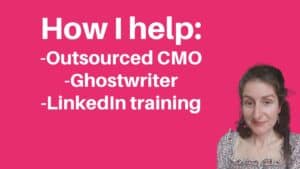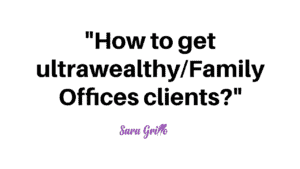Podcast: Play in new window | Download
How much will financial advisors make in 2021 (probably)? How much will financial planners make? In this blog I’m going to discuss what financial advisor salaries have been stated to be historically, and what I see happening in 2021 and for the industry going forward.
You’ll learn:
- What past financial advisor salary estimates have been
- Why it’s hard to track the amount of money that financial advisors earn
- Why how much you make as a financial planner matters
- The factors that drive how much financial planners get paid
- My outlook for the profit margins in financial advisor business models
- What it all means for what I see financial planners earning in 2021 and going forward
For those of you who are new to my blog/podcast, my name is Sara. I am a CFA® charterholder and am a financial advisor marketing consultant. In my weekly newsletter, I talk about financial advisor lead generation topics which is best described as “fun and irreverent.” So please subscribe!

Financial planner and advisor salary is probably understated
I’m writing this blog about how much financial advisors will probably make in 2021 because it seems like there’s just zero clarity about how much money financial advisors and planners get paid. I’ve seen data from the Bureau of Labor Statistics reporting that the median annual wage for financial advisors was $87,850 in May 2019.
$87,850 for median financial advisor salary?
Freaking a!
It’s a joke. There’s no way this represents reality. There wouldn’t be hundreds of thousands of people as wealth management advisors if the job really paid this way.
I mean, come on. You can make $90k teaching first grade in New York City, okay, and you don’t have to worry about anybody suing you because you sold two extra shares of some tech stock that you shouldn’t have. Plus you get the summers off.
in addition, in other analysis of financial advisor and planner salary levels that I have written, I’ve explained my skepticism in more depth. I’m not convinced that the job categories the BLS uses to track this data represents what is typically thought of as a financial advisor role. To clarify, I just don’t think the BLS has gotten it completely right.
There are other reasons, too, that are more abstract. I find it hard to believe that the average pay for someone in this role, a seasoned financial advisor, is less than $100k. I just don’t think as many people would do it if that were true given the level of high liability, licensing, and the stress associated with being in this role.
Remember that many financial advisors have a good portion of their net worth tied up in the business. They going to sell their book of business to the highest bidder and retire on it.
Also remember, many financial advisors’ salary is highly linked to their AUM; they make 1% (and 1% is really good to make given all the fee compression happening in the industry.
Financial planner pay histogram is not normally distributed
Financial planner salaries are probably quite lumpy instead of following a normal (uniform) statistical distribution. So, here’s what this means in plain English.
It seems like you have a lot of firms that are small, and then on the other hand you have a few that are killing it (Edelman, etc.) DeVoe & Company, according to an RIABiz article, states that two thirds of RIA firms manage less than $100MM, and the median amount is $38MM.
Wha?
Who’s the one measuring this?
I can only infer that what the higher paid advisors (the top financial advisors) make is somehow not being counted. Perhaps they are voluntarily excluding themselves from these studies.
-Sara Grillo, CFA
There also seems to be a lack of centralized reporting on this topic from within the industry itself. The CFA Institute, for example, publishes a compensation study annually that tracks the salary levels for analysts, portfolio managers, and the like. However I have seen no such study conducted by the CFP Board or the FPA (they must be busy organizing their fabulous conferences!).
This leaves us to rely on industry sources such as the SEC and FINRA and this data is hard to decipher for mere mortals like us. However, given how fragmented the landscape is, the data is sparse and hard to distill into figures that make sense (I’ve tried personally).
My heuristic take on how much financial planners make
From my own experience, and this is entirely heuristic, I would say that the $87k quoted by the BLS is more like entry level, what a junior advisor or planner with 1-3 years of experience would make. This is what you would expect to earn while you are building your book of business. Most financial advisors and planners that I know who have become established are earning $150k to $300, and there are of course the really successful ones who make $500k or more a year.
I saw ZipRecruiter estimated independent financial advisor salaries to be $133,750 per year. That would be more like it, in my opinion.
That is to say, these are my own assumptions based upon my experience in talking to my clients and industry contacts. Do financial advisors make good money? Usually, and usually way better than what the BLS says, according to what I’ve seen.
But let’s say we wanted to look at the general direction that I see financial advisor salaries trending in for the future. At the time of this writing, it’s January 2021. What do I see in terms of the way that salaries are going for wealth management advisors this year and even beyond?
So, let’s look at the trends.
What factors drive how much financial planners make?
Financial advisor compensation is driven by a few major factors:
(the list is below)
- How much the stock market rises or falls
- The net profit margin of your practice
- Demand for financial planning, investment management, and other services that financial advisors and planners provide
- The level and types of fees they charge
First, let’s examine each of these in depth.
The market
Goldman Sachs predicts that the S&P is expected to rise by 14% in 2021, according to a Marketwatch article. Nobody has a crystal ball, but let’s assume that the vaccine works wonders and life returns to normal(ish). It’s not inconceivable to see the market perform as Goldman suggests.
For example, for argument’s sake, let’s assume the market does rise by some figure between 10 and 20%, and let’s just go with what Goldman says and use 14%. What would this typically mean for financial advisor salaries? If the market were to rise by 14% we’d probably be looking at revenue rising by about 9%. No guarantees here, just an estimate. Now, RIA firms are different animals than broker-dealer firms or hybrids, but again, we’re just making broad estimates here and not getting too technical.
See how complicated this gets given how segmented this industry is?
LoL.
Profit margins
I’m going to say something wicked insulting (I’m from Boston originally btw did you guess?). Many of you financial advisors reading this don’t know what a profit margin is.
Whoooooops!
Yeah, I said it.
The operating profit margin for a company is a company’s operating income divided by its sales. You take your revenue, subtract out the cost of sales which includes salaries and all the costs that go into delivering your services. However you don’t subtract out taxes or interest (the latter not a big deal for most advisor firms anyways)– taking out those leaves you with net profit margin which is essentially the bottom line.
According to RIA Intel, Schwab Advisor Services’ 2019 RIA benchmarking study cited the median profit margin for RIA’s with $100 to $250 MM in AUM as slightly south of 29% in 2018. This concurs with what I have seen in my experience as a service provider to many of these firms.
So, where do I see this going in 2021?
I’m going to say another shocking statement. Are you ready?
I think profit margins for financial advisor firms are going to increase.
A ha!
Why?
A view inside the financial advisor income statement of the future
Let’s think about what the greatest expenses are on your income statement for most wealth management firms. It’s staff, followed by rent and capital equipment. The pandemic has forced many advisors into a virtual service model, and once life returns to “normal” there’s a high likelihood that in person meetings will remain out of favor.
Think about it. If you’ve been meeting with your financial advisor over Zoom for a year, are you going to be eager to get all dressed up, jump in the car spending money on gas and whatever else, and battle traffic? For instance, an opportunity arises to avoid it, and you will.
If you’re the owner of an RIA firm with three employees, after having them all work from home for a year, are you going to be eager to renew your lease? Many won’t be. Employees are used to the flexibility that comes with virtual work. Companies have gotten hooked up with DocuSign, LinkedIn, and Zoom and all of the other technologies that replaced our brick-and-mortar, paper-mongering office life – because there was no other choice. Even the industry conferences are now virtual.
The wealth management “asset light” business model has come upon us!
Think of how much you can save by not having employees work out of your office consistently. For example, you may not even need an office. And with that, you’ll need less capital equipment and fewer employees. If there’s less face to face interaction, there’s less of a need for the meet and greet team. If work can be done with technology instead of humans, and we’re all moving in that direction now that we’ve been forced to, staff expenses are likely to decline as well.
In short, the pandemic has forced the industry into an asset light existence that it never would have gone to on its own voluntarily. But it’s probably not going back and that should lift profit margins. Will this happen as early as 2021? We’ll have to see.
I kinda hope so.
Demand for the services that financial advisors provide
Are the services that financial advisors provide more or less valuable in a pandemic? In March of 2020 when the market dipped in a historically unprecedented fashion, there was certainly a high value in having someone there to tell people to hit the brakes and avoid selling at the low. But it wasn’t like everyone was running out the door (figuratively – we couldn’t go anywhere anyways, we were all quarantined) to hire an advisor.
I was reading an interesting article from ThinkAdvisor that cited data from Kiplinger claiming that 93% of investors in the US have less than $1MM to invest. If that’s true, I just see how demand is going up in times like these.
Who the heck is looking for a financial advisor in a pandemic, btw?
Some people, such as certain types of nurses and employee stock owners of Zoom, have fared very well during the pandemic. However many of the emerging affluent Americans are sidelined at home taking care of their kids while schools and daycares remain closed, or have suffered the loss of a business or their job. It’s not going to be easy for many of them to shell out $4,000 for a financial plan or $10,000 a year from an IRA that they are now having to consider tapping to pay next month’s rent. There are lower cost robos or digital service available and if I were strapped for cash and needed financial advice, that is where I would go right now instead of a human advisor.
I’d be looking to see higher demand from affluent prospects, not semi or emerging affluent, for me to get excited about investment advisor compensation increasing. A volatile or bear market creates the opportunity for high value advisors to take high net worth clients from those who haven’t done as good a job. A pandemic, not so much.
How financial advisors get paid
Industry experts talk about the move to flat or hourly fees but there doesn’t seem to be any conclusive evidence that this shift has occurred.
Who knows? To clarify, there’s no conclusive data on this.
When I start seeing Accenture and Cerulli headlines then I’ll believe it. But as of now, the industry is still a fee for AUM or commission driven business or a little bit of both, as far as we can assume.
Why financial advisor compensation levels matter
I’m making this pod-blog because many of you are a little bit lost about how much income you need to be making as a financial advisor. People tell me they want to market and grow their business. Most importantly, they want to scale their businesses! Certainly, they want to reach new heights!
Umm. What does that BS mean?
But, it sounds like such an empty, vague goal. It’s almost tacky like you listened to some Tony Robbins seminar or something and now you want to exceed your limits or whatever the latest motivational phrase is.
Above all, assign a number.
Revenue, net profit, number of clients
All of that.
So, write it down, and look at it every single month. To clarify, that’s what I do with my own business. I usually hit the number and if I don’t, there’s a good reason for it.
In other words, I’m not saying to go chasing money. However, I’m saying that you need to look at how much you’re making as a financial advisor as an expression of the market’s statement about the value of your services. What would you need to do for your clients to view you as delivering more value in their eyes? So, find out, and do it!
Consequently, every time I have set the revenue goal higher, I’ve always gotten to it by providing higher value. Not by working more, but by doing more for my clients and getting them better results. That is to say, you’re not being selfish by being concerned with how much you earn as a financial advisor. However, it’s a statement of value and for the sake of those you serve you need to understand what you are really worth to them. It’s telling you how much what you are doing really matters or makes a difference because if it does, they’ll pay for it and tell their friends about you.
How much will financial planners make in 2021? The bottom line is…
The biggest driver of financial advisor and planner salary levels, on average, is the market, and if it has a good year in 2021 it’s not inconceivable to see wealth advisor salaries rise by 3-5%. However, and this is a big however, you just can never predict what will happen with stock market movements or any other of the other factors that dictate what wealth management advisors earn.
If you want to make more money as a financial advisor your best bet is to focus on what you can control. That is the quality of your prospecting. Unlike most of the other people doing what I do, I think most financial advisor marketing is BS. In other words, I focus on a quality over quantity approach that emphasizes engagement at the expense of volume.
Sara’s upshot
What’d ya think? Was this helpful?
If yes…

- I am an outsourced CMO for companies who need regular, full service marketing – blogging, social media posts, newsletters, etc.
- I am an hourly consultant for those who just need one-time or recurring guidance
- People hire me as a ghostwriter to write content for a project fee
- I have a social media training program
- I have a book about what to say on LinkedIn messenger
Just letting ya know, in case you need me at some point.
Thanks for reading. I hope you’ll at least join my weekly newsletter about financial advisor lead generation.
See you in the next one!
-Sara G
Sources
Bureau of Labor Statistics, U.S. Department of Labor, Occupational Outlook Handbook, Personal Financial Advisors,
Retrieved on the Internet at https://www.bls.gov/ooh/business-and-financial/personal-financial-advisors.htm (visited October 25, 2020).
Khatta, Manish. (2020, Oct 15th). RiaBiz. As the RIA business merges toward big and centralized, small nimble firms still have a lock on doing well and making a great living. Retrieved from https://riabiz.com/a/2020/10/15/as-the-ria-business-merges-toward-big-and-centralized-small-nimble-firms-still-have-a-lock-on-doing-well-and-making-a-great-living
Denton, Jack. Marketwatch. (2021, January 14th). Goldman Sachs says the S&P 500 will rise 14% in 2021. Here’s the road map. Retrieved from https://www.marketwatch.com/story/goldman-sachs-says-the-s-p-500-will-rise-14-in-2021-heres-the-road-map-11610627051?mod=article_inline
Kiplinger. As mentioned in Welsh, Timothy. (2020, November 10th). ThinkAdvisor. Why Small Is the New Big for RIAs. Retrieved from https://www.thinkadvisor.com/2020/11/10/why-small-is-the-new-big-for-rias/.
ZipRecruiter. Independent Financial Advisor Salary. Retrieved from https://www.ziprecruiter.com/Salaries/Independent-Financial-Advisor-Salary on January 23, 2021.
Disclosures
Music is Nice to You by the Vibe Tracks
Grillo Investment Management, LLC does not guarantee any specific level of performance, the success of any strategy that Grillo Investment Management, LLC may use, or the success of any program.
At Grillo Investment Management, LLC, we strive to maintain current information however it may become out of date. Grillo Investment Management, LLC is under no obligation to advise users of subsequent changes to statements or information contained herein. This information is general in nature; for specific advice applicable to your current situation please contact a consultant or advisor.
Nothing in this article or podcast can be construed as legal or compliance advice. For advice about complying with your company’s regulations regarding marketing-related activity, please consult your legal or compliance officer.





